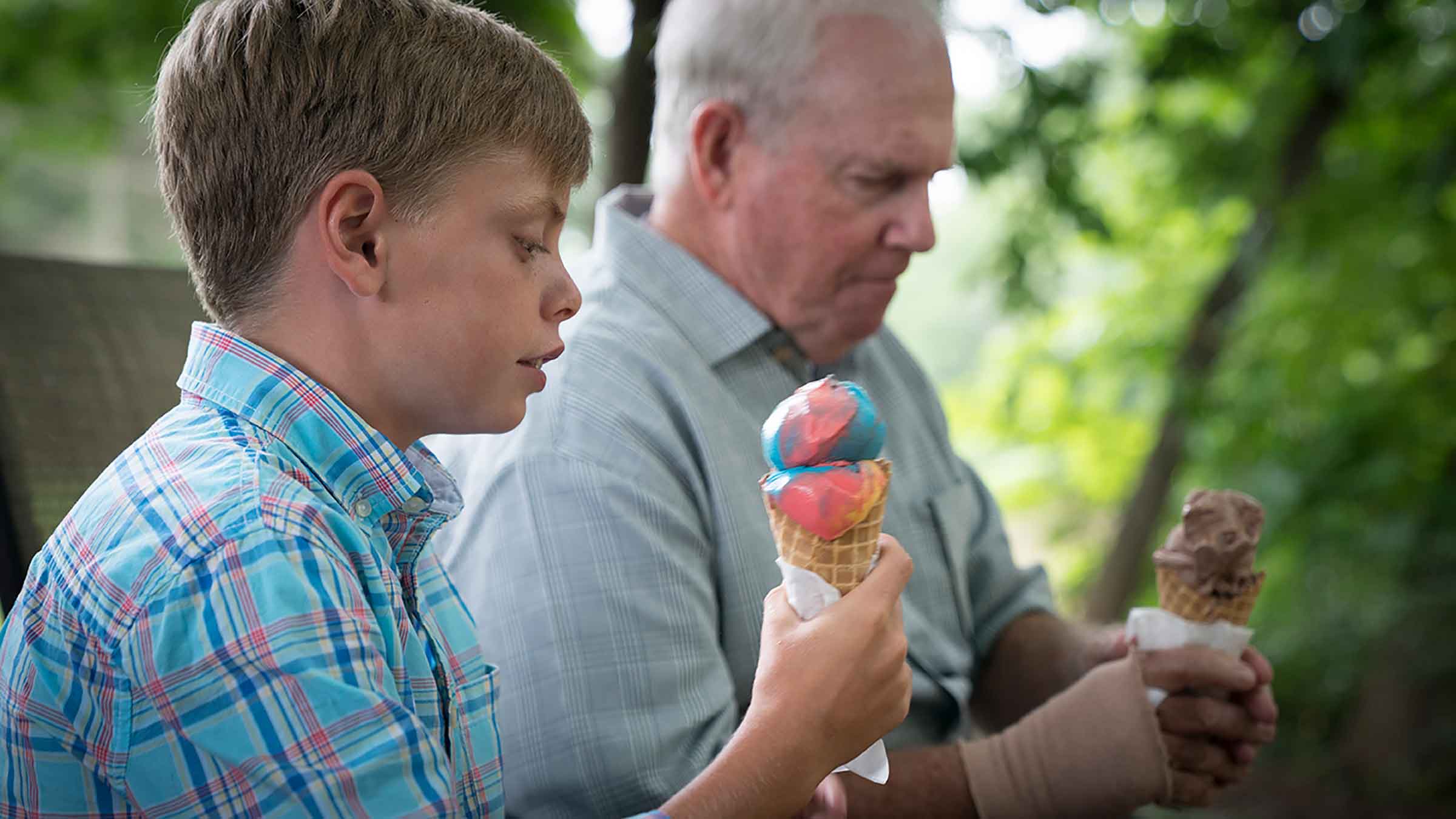How to Deal With Sundowners: Advice From Caregivers

CaringBridge Staff | 11.12.21
Sundowning is a symptom of Alzheimer’s disease, and commonly appears as restlessness and agitation that worsens as the sun goes down. Because of this, both patients and caregivers often suffer from sleepless nights and low functioning days.
When caring for a loved one with Sundowners Syndrome, you may feel at a loss for what to do or say. Know there are methods for alleviating some of the stress both of you may feel by helping your loved one cope with their symptoms. We asked our community to share their advice on coping with the symptoms of Sundowners. Read on for their advice and inspiration:
1. Accept What You Cannot Change
“Number one, remember you will not stop Sundowning! So to go with the flow is best! My mom would walk constantly around and around the house. Make sure there are no throw rugs to trip them up. Give them space. If they say they are walking to a specific place, after a little time, use your phone to pretend to call that person or place and tell them that the place is closed and they can try again tomorrow.
During Sundowning is when ‘compassionate fibbing’ comes in very handy. They usually talk about their past as if it is today, wanting to talk to or go visit loved ones that have passed away years ago. Go along with them but tell them they are gone tonight or on vacation.”
Tereasa C.
2. Agree, Then Refocus
“Be calm. Always agree, never argue or correct. And then, refocus on something else (music, or a game or craft). Refocus. It works.”
Kathy H.
“Always agree and then change the subject.”
Mary Ann H.
3. Give Your Loved One Something To Do

“Another really helpful thing is to have a small basket of socks or hand towels ready to sort. My mom would wake up in the middle of the night and wonder where everyone was. Having this handy for busy work would keep her satisfied for a bit and then she would get sleepy again. Vs. walking around in the dark.”
Shawn W.
4. Create a Calming Environment
“Play their favorite calming videos or music, diffuse essential oils, or any other thing that is calming. The main thing is to not try to stop the behavior unless it is going to hurt them or someone else. Sometimes a car ride to get ice cream or a root beer or just going for a drive will be beneficial!”
Tereasa C.
“Music, well-lit house, Christmas lights, and companionship.”
LaDonna G.
“Dim lights, soft music or soft outdoor sounds like water and frogs. Someone by their side is always helpful.”
Shawn W.
5. Do Something Fun Together
“Be calm and use your imagination. My mom and I went on some wonderful trips together but never left the house.”
Becki S.
6. Offer Reassurance and Love

Above all, your love is what matters. Oftentimes your loved one may simply need a hand to hold and to be told everything is going to be okay. No matter how tired you may feel, know that with your reassurance you have the power to offer your loved one a bit of comfort.
“Sundowning is a heartbreaking thing to watch but my best advice is to simply continue to stay calm and love them through it. Don’t be confrontational, just keep them safe.”
Teresa F.
“Lots of love & patience.”
David G.
7. Take a Break
The strain from caring for your loved one can add up. It may feel nearly impossible, but it is so important that you carve out time to take care of yourself.
One way to get that time is by rallying your community for support. There’s no need to downplay what you’re going through or worry about being a burden. Ask your neighbors, coworkers, friends and family for the help you need. In most cases, they’ll be happy and willing to help out where needed!
To make this process easier, consider starting a CaringBridge site for your loved one. Each free site comes with a Planner feature to help you coordinate and share caring tasks. It’s a simple, effective way to get others involved with providing care.
For more advice on how to make space for yourself, check out these tips to heal from caregiver burnout.
Don’t go through your health journey alone.
You can stay connected to friends and family, plan and coordinate meals, and experience love from any distance.
All of this is ready for you when you start your personal CaringBridge site, which is completely free of charge, ad-free, private and secure. Don’t spend another minute alone!
What’s Your Advice?
If you have cared for someone suffering from Sundowners syndrome, what strategies have helped you both cope? Please feel free to share your stories and ideas in the comments below.
I had 2 older sisters, a brother and a father-in-law who had Alzheimer’s. So I’ve seen a lot. One of my sisters used to ask how our parents and some siblings were doing who had passed. The first few times I told her they had passed and she got upset each time and had suffered the pain of loss of a loved one. I learned to answer “about the same” and change the subject. She was fine with that answer. It spared her from going through the loss over and over.
Another thing we learned as a family if they become combative it may be a prescription they’re on. When it happened with my sister we were told by the administrator of the facility where she lived to talk to her doctor about having her medicines re-evaluated. The doctor admitted her to the hospital unit that did that for 2 weeks and some of her meds were changed. She was so much better after that. Hope some of this may help someone dealing with a loved one with Alzheimer’s.
My Mom just underwent two surgeries from falls., A broken arm and the many falls later a broken hip. She is 85 years old, not diagnosed with dementia but her sun downing is filled with paranoia violent thoughts and even from the hospital she calls the police. She is now back in rehab and I do not see her at night but when I call her she is in a nasty violent agitated state. Sometimes I am scared for her safety and those that are around her. I know that nurses and aides are more than familiar with this but I feel for them too. She yells profanities at them is completely nasty and threatening.
Is there any prescription drug that can calm her? The next day I see her she does not remember and is as lucid as can be. Does anyone have any words of advice? Thank you in advance.
My mother came home after nearly 4 years living in a drugged state in a neglectful nursing home. After a bad choking on food experience with no attention or help she was traumatized and will no longer eat anything solid, only consumes Ensure Complete. She survived post double called Covid, pneumonia and pulmonary emboli. She came home with me via ambulance helpless and frail as an infant.
She has been home 5 months and 18 days. She calls out HELP several times per hour between approx 11:15 pm until morning around 7 am. She is exhausted and may nap during the day. I am exhausted and cannot nap.
She generally improved after removing 2 anti-psychotic drugs from the nursing home regimen; she is no longer stupefied. She is alert, conversational and fun to be around during the day.
I am working on getting help at night to help me rest.
All this being said … is this sundowners or residual effects of nursing home neglect and abuse?
I don’t know if my recipient had Sundowners specially? But he did have Alzheimer’s. I was his ‘Live-in Caregiver’
I began to notice a pattern in my 92 year old male client. I noticed he would become agitated when me or his daughters or sister would be making his schedule or or choosing things for him. I started dong things like for example, when getting him ready to get dressed for the day I would hold up two shirts and say “Charley which shirt would you like to wear today?” Letting him decide. I would try and do this type of giving him the option to choose and he became less irritable. I can imagine having spo many things become out of a mans control must be very difficult for them.
Rose D’Amato was a dynamo almost to the end of her 101 years. It will be 3 years 1/27/22; how time doesn’t fly in my case anyway. Mom started calling out to me around 8 p.m. getting really restless, especially because she was doing much more sitting because of her falling more frequently. She’d say ” Honey, pray for me” I always feel better when you do. We’d hold hands and pray together and then I would tell her stories of faith, courage and most of all the hope we have of the resurrection and everlasting life. She’d always say ” Gosh, I hope you’re right”, and it made me chuckle a little. I knew she was listening. She’d apologize for bothering me, but I would give everything I own right now for just one more ” Sundowner” evening with her.
I used to get my mother home if out shopping etc. Make her fav snack: ginger ale and saltine peanut butter crackers . Quiet time . Liked to draw so got her sketch pad and pen and she drew . Did some mind riding as my Grandmother called it. Really was reminiscing. Very comforting. I still have her drawings and it has been 11 years since she passed. Also played her fav music softly. She liked 40-50’s music. Sun downing was usually about 3-5. Always that was when she became really tired esp. if she not slept well. Hope that this is helpful to someone. Merry Christmas.